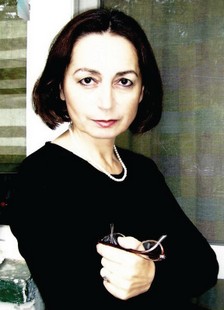
Carmen Maria Cârneci (1957, Romania) as a composer, received important awards in Mannheim, Rome, Köln, Bucharest and Hong Kong, and commissions from major institutions and festivals, among them The State Opera in Bonn, ‘Donaueschingen Musiktage’, the ‘ensemble für neue music zürich’. She has been invited to several festivals of new music in Donaueschingen, Dresden, Heidelberg, Zürich, Saarbrücken, Luxemburg , among others, both as a conductor and a composer. She was the artistic director of the ‘Rossini in Wildbad’ Festival in 1992 and 1993, and a guest conductor in Stuttgart, Milan (Piccola Scala), Paris (Opéra Bastille) and Bonn, where she conducted the premiere of her own chamber opera GIACOMETTI (1996). In 2005 she has founded the ensemble “devotioModerna”. Her works are published by Ricordi (München), Furore-Verlag (Kassel) and Editura Muzicala (Bucharest).
“denn der Tag war noch ganz / Play the Day”- for flute, violoncello and piano (2002/2012)
“For what do we need time?” asked a 11-year-old Amerindian boy in his poem, referring to those days of childhood as human age – but also as an age of a civilization, I would add – and he concludes: “We had more time then / as the day was still as a whole” (original title in German: denn der Tag war noch ganz). I have renamed this piece in Romanian “Play the Day”; it may be regarded as a more free or rigorous playing with some aspects of the Time parameter, mainly: tempos and rhythm. In fact, the composition of this piece became a game of interpreting the sentences in the poem, an attempt to rewrite them with the help of ten music-words (motifs) which submit to strictly formulated rules of succession, inner variation, and types of cadences. The correspondence between the poem and the musical phrases that resulted in this way is not semantic, but temporal; it manifests itself through durations: long words in the text generate ample motives in the music, short words demand concentrated, rapid motifs. Furthermore, I have activated a dimension that is specific to children’s play: the roles. Thus, there is a narrator, a companion and a spontaneous commentator, three roles that interchange with one another as in a relay race among the three instruments. All this complex elaboration of the piece was aimed to bring in a ludic tonality and a timeless mood. (Carmen Carneci)


